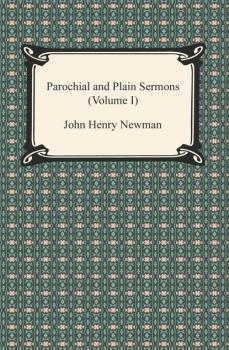John Henry Newman
Список книг автора John Henry NewmanParochial and Plain Sermons (Volume II)
John Henry Newman (1801-1890) was a significant figure in the religious history of nineteenth century England. Cardinal Newman was a leader of the Oxford Movement which eventually lead to the development of Anglo-Catholicism. No small presence within religious literature, John Henry Newman also wrote a great deal of tracts, hymns, and apologias. Here are collected thirty-two sermons, in Volume II of his «Parochial and Plain Sermons». These sermons are essential to an understanding of Newman's theological development as well as the dynamic changes that occurred within the Catholic Church in the 19th century. A diverse collection, Newman writes on «Faith without Sight», «Self-Contemplation», «The Indwelling Spirit», as well as much more. These sermons were all preached on Sundays by Newman at his Anglican parish, Saint Mary the Virgin, Oxford. Essential to any student of theology and philosophy, these sermons mark a great change in the Anglican and Catholic traditions.
Apologia Pro Vita Sua
John Henry Newman was a very prominent religious figure throughout his life. As such, he came under fire for his staunchly traditional beliefs. “Apologia Pro Vita Sua” is an articulation and defense of the stance he took regarding the Anglican and Roman Catholic churches. Once a clergyman in the Church of England, Newman believed that the church had regressed and strayed from certain Catholic tenets, regarding dogma and worship. Eventually, distraught by the Anglican Church, Newman left for the Roman Catholic Church, eventually receiving the title of Cardinal, granted by Pope Leo XIII. In 1864, Newman was attacked by Kingsley, an Anglican clergyman in a magazine article, criticizing Newman for lacking reason or regard for truth. “Apologia Pro Vita Sua” was Newman’s response, giving rise to the idea that Newman’s intelligence served as a balancing counterpart for his faith. Today, it is apparent that Newman’s lengthy essay silenced his critics.
The Idea of a University
Cardinal John Henry Newman was a major figure in the Oxford Movement, a response by the members of the Church of England to a perceived attack by the reforming Whig administration who had already legislated a restructuring of the Church of Ireland. Members of the Oxford Movement feared the secular appropriation of ecclesiastical property and moved to assert their religious authority by returning the church to its Catholic origins. In 1854 John Henry Newman became the Rector of what would become University College, Dublin, a position he would remain in for four years. Based on his experiences as the leader of an educational institution he would publish a volume of lectures explaining his philosophy of education entitled “The Idea of a University”. That work which is presented here is an early document of ideas around University education from the first-hand perspective of a man who had a hand in creating one. Religious and educational scholars alike will find much interest in this treatise by one of the most prominent of all religious literary figures.
Apologia Pro Vita Sua
A highly influential figure in the Church of England, John Henry Newman stunned the Anglican community in 1843, when he left his position as vicar of St. Mary's, Oxford, to join the Roman Catholic church. Perhaps no one took greater offense than Protestant clergyman Charles Kingsley, whose scathing attacks against Newman's faith and honor inspired this brilliant response. Apologia Pro Vita Sua, Newman's spiritual autobiography, explores the depths and nature of Christianity with flowing prose and a conversational style that has ensured its status as a classic."False ideas may be refuted by argument, but by true ideas alone are they expelled. I will vanquish," Newman promised, «not my accuser, but my judges.» His honest and passionate defense consists of a personal history of his religious convictions, from earliest memory through the Oxford movement and his ultimate conversion. His concluding point-by-point refutation of Kingsley's charges features thought-provoking contentions that strike at the very roots of the principles underlying Protestantism. Newman won respect and admiration with his Apologia, a work that has helped clarify perceptions of Roman Catholicism among readers of every faith.
Parochial and Plain Sermons (Volume I)
John Henry Newman (1801-1890) was a significant figure in the religious history of nineteenth century England. Cardinal Newman was a leader of the Oxford Movement which eventually lead to the development of Anglo-Catholicism. No small presence within religious literature, John Henry Newman also wrote a great deal of tracts, hymns, and apologias. Here is collected twenty-six sermons, Volume I of his «Parochial and Plain Sermons». These sermons are essential to an understanding of Newman's theological development as well as the dynamic changes that occurred within the Catholic Church in the 19th century. A diverse collection, Newman writes on «Religious Faith Rational», «The Christian Mysteries», «Religious Emotion», as well as much more. These sermons were all preached on Sundays by Newman at his Anglican parish, Saint Mary the Virgin, Oxford. Essential to any student of theology, these sermons mark a great change in the Anglican and Catholic traditions.
La idea de una universidad
La obra The Idea of a University es considerada un clásico y referente ineludible en el tema de la educación superior. La colección de discursos escritos por el cardenal John Henry Newman en 1852 con ocasión de la fundación de la Universidad de Dublín, trazan con maestría los propósitos y objetivos que deben sustentar una universidad y conservan plena vigencia hasta hoy.El destacado humanista y académico de la universidad de Oxford aborda temas que fueron polémicos en sus días y que continúan encendiendo el debate, como el desarrollo del pensamiento y la cultura de los estudiantes, la educación liberal y el valor del conocimiento como un fin en sí mismo.Newman sitúa a la filosofía como fundamento del saber y de la búsqueda de la verdad y explica de qué manera están conectadas las ciencias, con la teología como principio unificador de todos los demás conocimientos.Esta traducción editada rescata las ideas principales del cardenal Newman y constituye una oportunidad única para profundizar en las ideas sobre la educación superior y conocer un poco más a uno de los más grandes intelectuales del siglo xix.









